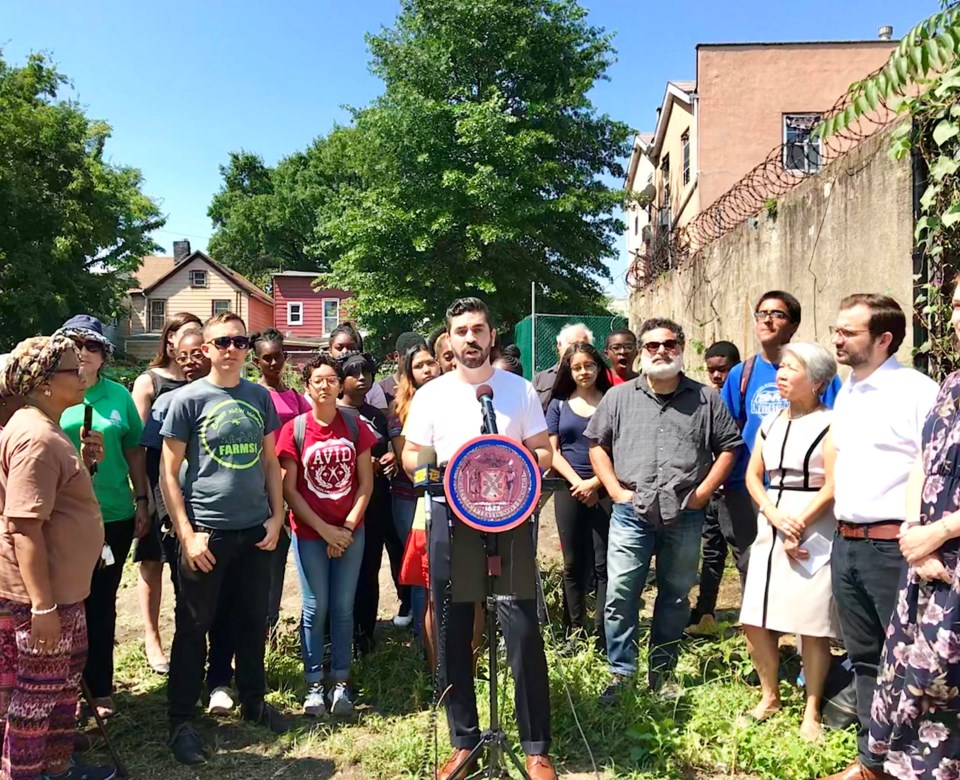Councilmember Rafael L. Espinal Jr. and Borough President Eric L. Adams, joined by representatives of East New York Farms, the NYC Community Garden Coalition and community stakeholders, announced today at East New York's Ashford Abundant Garden the launch of their joint campaign to boost urban agriculture in New York City.
The announcement comes one week after Espinal introduced a legislation package that would require the city to produce a report on the potential of urban farming, create a comprehensive urban agriculture plan as well as extend the period by which a community garden's license can be taken away.

"Urban agriculture just makes sense," said Espinal. "It promotes a healthy lifestyle, reduces our carbon footprint and strengthens communities. Especially for low-income neighborhoods like the ones I represent, which have historically lacked access to fresh, healthy produce, urban agriculture can help close the 'freshness gap.'"
There are currently 60 community gardens in East New York, more than in any other neighborhood in NYC. Community Gardens such as Ashford Street Abundant Garden were often started by local residents to clean up vacant lots.
"In East New York and similar neighborhoods across the five boroughs, community gardens have led the way for urban agriculture in NYC," said David Vigil of East New York Farms. "Gardeners have put neglected land to positive use by growing food, planting trees, training young people and building community. The majority of local produce harvested in NYC is grown in the soil in a community garden."
A feat the city has yet to fully recognize, according to Adams and Espinal who already introduced similar legislation last year, yet were met with resistance.

"I understand that housing is a pressing issue, especially here in East New York. But to have a thriving community, we must value the spaces that nourish us and not just house us," said Espinal. "We need people who work and believe in these gardens to push the administration to understand why this is important."
The borough president and the councilmember already did part of the homework for the city. Since last year, they worked with Columbia University graduate students to analyze the impact of the various sectors of urban agriculture which is estimated to be a $9 billion industry in the U.S. and has the potential to feed 20 million people in the New York City metropolitan area alone. Additionally, the students created an agricultural blueprint that the city simply could implement, according to Espinal.
"We have seen the growing momentum of support for formalizing urban agriculture systems in all their forms," said Adams who has been an adamant healthy foods advocate. "Whether that is traditional soil-based community gardens that have been holding down blocks for decades, or technology-driven urban innovations like hydroponic and vertical farming that are emerging as a new industry. We have the potential to revolutionize our city's food system and turn a page on protecting our health and environment while bolstering our economy."

Espinal has emerged at the forefront of pushing for a greener, more sustainable city. In May, he proposed a ban on plastic straws and in July he introduced a bill to require all new commercial buildings to be equipped with green roofs. Less than two weeks ago, another joint project with Adams came to fruition when the city launched NYC Urban Agriculture, a web portal that provides community gardeners and urban farmers with information and resources.
NYC is undergoing a green revolution, and it is starting right here in Brooklyn.




